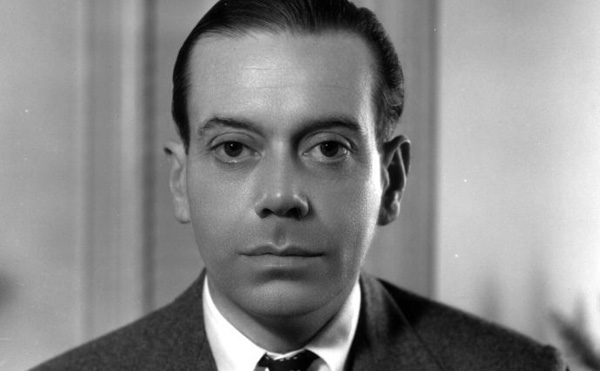In Celebration of the Human Voice - The Essential Musical Instrument
Home | Doo Wop | Barbershop | World | Contemporary | Christian | Vocal Jazz | Choral | Christmas | Instructional | Arrangements
Classical | Opera | Musicals | Personality | Young Singers | Disney | Videos | Songs | The Artists

Cole Porter Biography

Click Here for Sheet Music and Songbook Vocal Arrangements
The only child of Samuel Fenwick, a druggist, and Kate Cole, Cole Porter, born in Peru, Indiana on June 9th, 1891, was given a lot of attention. His parents offered him opportunities to study music, acting, or anything else he wanted, but he opted to study violin and piano. Starting at an early age, Porter had completed his first song, "Song of the Birds," by the age of ten. A few years later, his mother had his piece, "The Bobolink Waltz," published. A few years later, his parents decided to send him to a private boarding school called Worcester Academy, in Massachusettes, which was said to have a strong music department. He entered Yale a few years later. The large size of the university allowed him to find many musical opportunities, from writing two of Yale's best known football songs ("Bull Dog" and "Bingo Eh Yale") to accompanying vocal groups and musical productions. Porter graduated with a "Most Entertaining," award. During his junior year of college, Cole Porter created his first show, See America First. Unfortunately, it was not very well-received by audiences, and as a result, ran for only 115 performances before closing. However, many say that had Porter not had this initial set-back, he would not have had the motivation to push forward and make one of the smartest moves of his life - he moved to France. While in France, Porter had an opportunity to practice song-writing, and wrote songs such as "An Old-Fashioned Garden," which was his first popular hit, for a 1919 show titled Hitchy Koo. That same year, Cole Porter met and married Linda Lee Thomas, a wealthy woman who was considered by many to be the most beautiful woman in the world. They remained married for thirty-five years, until her death in 1954. Although Cole Porter had a large group of friends, many of them didn't understand his career, and often encouraged him to "retire," living off of the abundant money from his wife. They saw his song-writing career and purely geared toward his friends, and thought he wrote only amusing party songs. However, Porter was very serious about his career, and in 1923, he shocked them all when he wrote the score for Within The Quota, a jazz ballet written by Gerald Murphy. Late in the 1920's, Cole Porter and his wife decided that the place to go, if Porter was going to make a name for himself, was Broadway. And so he did. In 1928, Porter introduced his first Broadway show, Paris, which featured songs such as "Let's Do It, Let's Fall In Love," which is now considered a timeless, sophisticated piece. The next year, Porter created Fifty Million Frenchmen, featuring "You Do Something To Me" and "You've Got That Thing." It was at this time that Cole Porter began developing a signature style, which blended humor, sensuality, and innuendo. Although the 1920's were important years in Porter's life, nothing could compare to the 1930's. In this decade, it seemed that Porter spat out hit after hit after hitSwith no forseen end! Among his hit shows were The New Yorkers, Gay Divorce, Jubilee, Dubarry was a Lady, and Red Hot and Blue. In addition, Porter wrote the score for many Hollywood musicals (including Born to Dance and Rosalie). Toward the end of the decade, in 1937, however, Porter got in a serious horseback riding accident. Although the doctors finally decided (after much thought) against amputating his legs, the thirty surgeries in the years to come were no easier to take, especially because the majority of them were unsuccessful. Cole Porter attempted to remedy this by delving deeper into his work, and in the early 1940's, Porter created a few shows, including Panama Hattie, Let's Face It, and Something for the Boys. These were not well-received, and many thought he had lost his gift. However, as proven earlier, Porter was very motivated by failure, and he thus proceeded to create the shows which would be the biggest successes of his career. In 1948, Porter wrote Kiss Me Kate, a musical based on Shakespeare's "The Taming of the Shrew." It ran for ovre 1,000 performances. The next year, he came out with Anything Goes, which almost paralleled Kiss Me Kate's success. He had shown them all that there was still something left in him However, after proving his point, Porter's motivation began to die down, and although he did create a few more shows, among them Can-Can, Silk Stockings, and High Society, Porter's last years were far from wonderful. Having his wife die in 1954, and having his leg amputated in 1958, Porter was left somewhat alone and sad. However, these last years of Cole Porter's life are no representation of his career, which was filled with excitement, energy, and hapiness. In 1960, he was honored with an honorary doctorate from Yale. It let him know that no one would forget him, and that all his talent was understood and appreciated. Porter died four years later. Media Articles |
Select a Category |
Want to Sing? - Find a Chorus Near You
List of Choruses by State | List of Choruses by City
